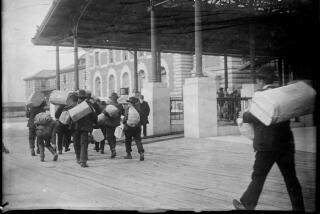America the Dutiful
- Share via
The 18th century writer J. Hector St. John de Crevecoeur, in his “Letters From an American Farmer,” described the people of a young country being shaped into a new breed by the melting pot that would one day transform the world. Today, Americans of every ethnicity and religion are reckoning with what they stand for. At the core of being “American” are choices large and small.
Most American Muslims have reacted to the atrocities of Sept. 11 with the same horror and outrage as their fellow countrymen. But some junior high students at an Islamic religious school in Washington, D.C., recently said that being an American means nothing more than being born here and that they don’t believe Osama bin Laden is such a bad guy--views the school reportedly had encouraged. That even a few young people in today’s melting pot hold such shocking notions, and feel no particular allegiance to the nation that lets them freely express those views, should spur others to rethink what it means to live in this country.
Sept. 11 and its aftermath have plunged all of us into self-definition and reflection. In our jittery state, we are rediscovering a few things about ourselves as a nation. Among them should be that we are no mere assemblage of peoples who happen to be born here or cast here by lot, as the youngsters said, but rather, as Crevecoeur discerned, a people with its own identity. And once we become Americans by birth or naturalization, we also have choices about what we do with that status.
Just days after the bombing of the World Trade Center, traders in New York who had been blasted out of their offices were up and running. They told television’s “60 Minutes” that they had made a conscious decision to carry on because they understood what it was to be Americans and to have their way of life attacked. Contrast this “choice” with citizenship misused. A federal prosecutor in the same city last week described one of four men sentenced in the 1998 embassy bombings in Africa--a naturalized citizen from Lebanon--as someone who had abused the choice and opportunity to “help himself, his family, his country” that the United States had given him.
Being American is a matter of individual understanding, of asking questions we all answer for ourselves. Every generation must discover for itself the responsibilities of citizenship, just as those who pulled the country through the extreme tests of national character did during three previous centuries.
One special lesson of this particular moment--when some are nervous about flying or the ordinary act of opening the mail--is that living up to one’s obligations demands recognizing that being an American is much more than a notation on a birth certificate. Schools that fail to inculcate a sense of commitment to this country do students a potentially crippling disservice. Under the United States’ 1st Amendment rights and religious pluralism, they of course are free to do just that. As a consequence, institutions and individuals need to work harder to communicate the meaning of being American, so that today’s young people and future generations can carry forward the great experiment in democratic life.
More to Read
Get the L.A. Times Politics newsletter
Deeply reported insights into legislation, politics and policy from Sacramento, Washington and beyond. In your inbox twice per week.
You may occasionally receive promotional content from the Los Angeles Times.










